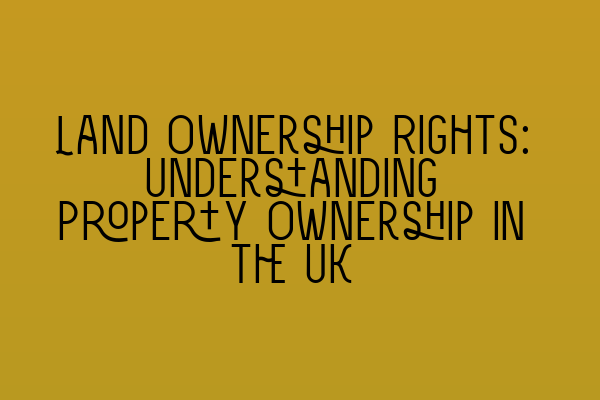Land Ownership Rights: Understanding Property Ownership in the UK
When it comes to property ownership in the UK, there are various rights and responsibilities that individuals should be aware of. Understanding these land ownership rights is crucial to ensure a smooth and legal transfer of property. Whether you are buying, selling, or inheriting land, having a solid grasp of property ownership laws is essential. In this article, we will dive into the details of land ownership rights in the UK, covering key concepts and legal principles.
Types of Property Ownership
In the UK, there are two main types of property ownership: freehold and leasehold.
Freehold ownership grants the owner absolute ownership of both the land and the buildings on it. This means that the owner has full control over the property and can make decisions regarding it without needing permission from anyone else. Freehold ownership is typically indefinite, lasting for an unlimited period of time.
On the other hand, leasehold ownership gives the owner the right to use and occupy the property for a fixed period of time. The owner of the land, known as the freeholder, grants the leasehold ownership to another party, known as the leaseholder, for a specific term. Although the leaseholder has certain rights and responsibilities, the ultimate ownership of the property remains with the freeholder.
Legal Framework for Land Ownership
In the UK, land ownership rights are governed by a complex legal framework. The primary legislation that deals with land ownership is the Law of Property Act 1925. This act outlines the various rights and responsibilities associated with property ownership, including the transfer of property, creation of leases, and registration of land.
Additionally, the Land Registration Act 2002 introduced a system of compulsory land registration in England and Wales. This means that virtually all land transactions must be registered with the Land Registry, providing clarity and transparency in regards to land ownership.
Transfers of Land Ownership
When transferring land ownership, several legal steps must be followed to ensure a valid and legal transfer. Firstly, the seller and buyer must enter into a legally binding contract known as a conveyance or a transfer deed. This document sets out the terms of the transfer, including the purchase price, description of the property, and any conditions or restrictions attached to the transfer.
Once the contract is signed, the transfer must be registered with the Land Registry. This registration process serves to protect the new owner’s rights and provides evidence of their ownership. It is worth noting that if the property is mortgaged, the lender’s mortgagee interest will also be registered.
It is essential to seek professional legal advice when transferring land ownership to ensure compliance with all legal requirements and to protect your rights as a buyer or seller. A property solicitor can provide expert guidance and handle the necessary paperwork and registrations on your behalf.
Restrictions on Land Ownership
While property ownership grants certain rights, there are also restrictions that need to be considered. Some common restrictions include:
- Restrictive covenants: These are obligations or limitations imposed on the use of land by a previous owner. They may include restrictions on building height, use of the property, or the requirement to contribute to the maintenance of shared facilities.
- Planning restrictions: Local authorities enforce planning regulations that restrict how land and buildings can be used, developed, or modified. These restrictions aim to control the impact on the local area and ensure compatibility with zoning and environmental requirements.
- Easements: Easements grant someone the right to use someone else’s land for a specific purpose. This may include rights of way, rights to access utilities, or rights to drainage and sewers. Easements can significantly affect land use and development plans.
- Rights of third parties: In some cases, third parties may have rights over a property that are not immediately apparent. For example, a neighboring property may have a right to light, which restricts the construction of buildings that would block their light source.
Understanding these restrictions is crucial when buying or developing land. A property solicitor can conduct a thorough investigation of the property’s title and advise on any potential restrictions that may affect its use or value.
Conclusion
By understanding land ownership rights in the UK, individuals can navigate property transactions with confidence and ensure compliance with legal requirements. Whether you are a buyer, seller, or inheritor of land, seeking professional legal advice from a property solicitor is highly recommended. They can guide you through the intricacies of property ownership, protect your rights, and help you make well-informed decisions.
For further information related to property and contract law, please check out our related articles:
